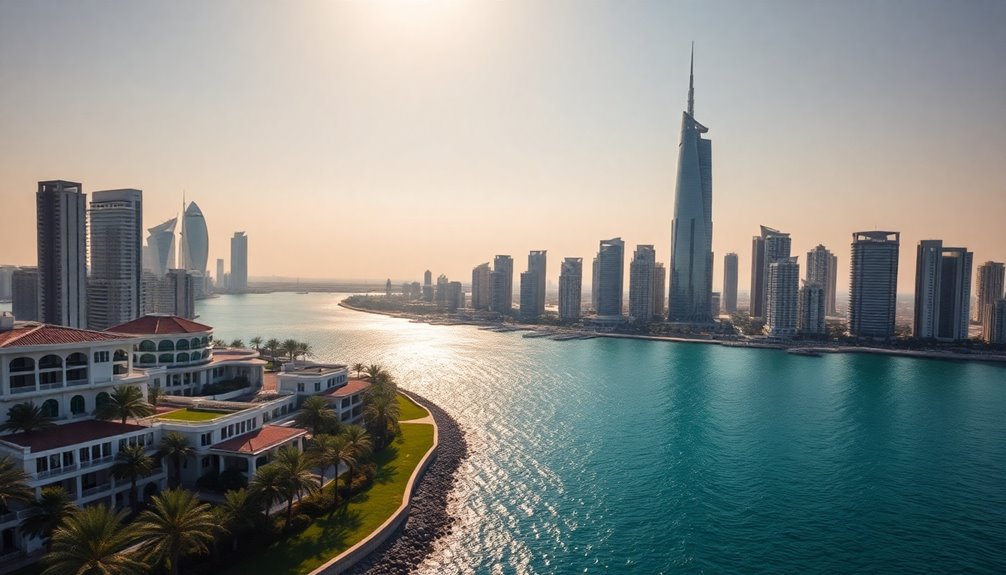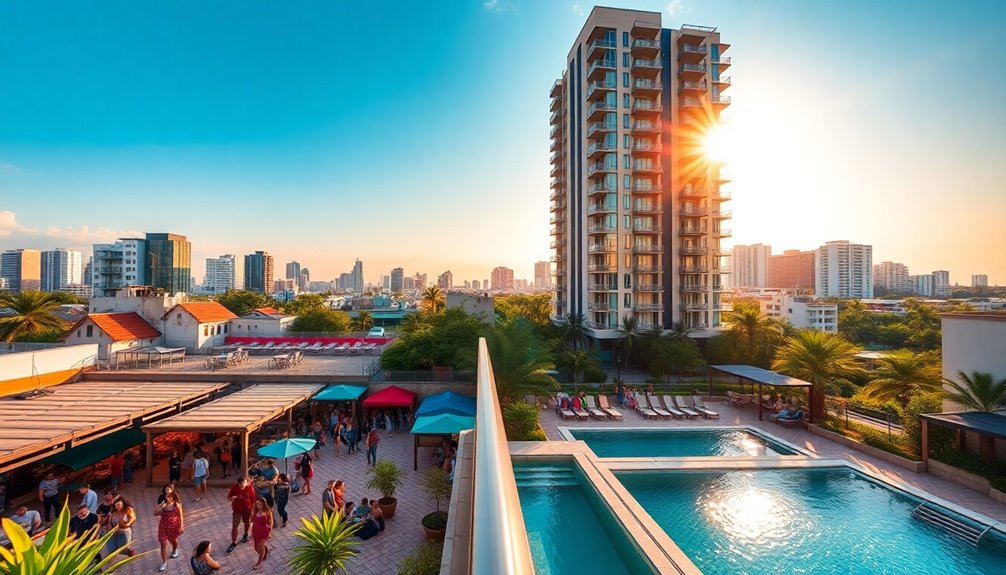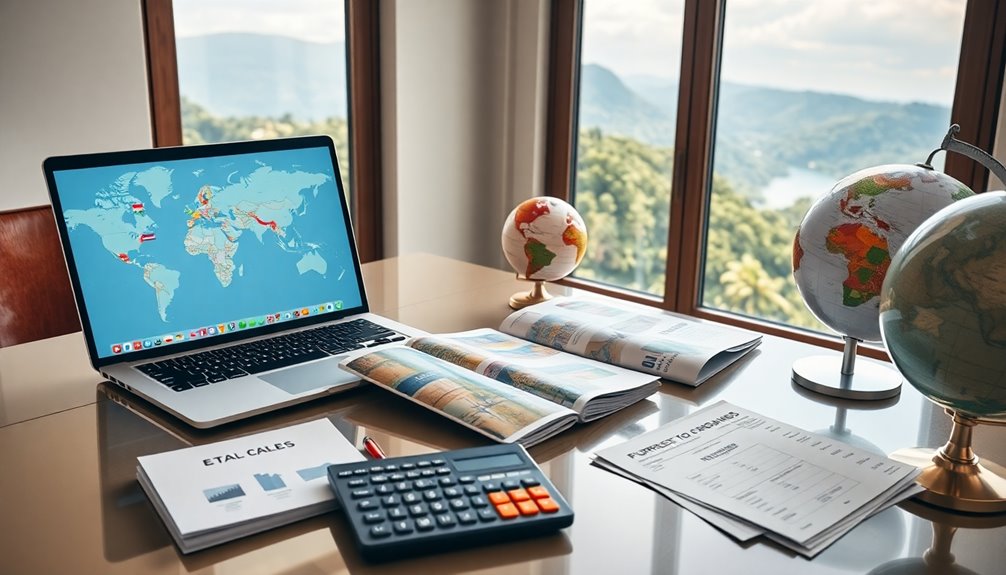If you're considering investing in Bahrain's property market, you're in for an exciting opportunity. Foreigners can buy property in designated freehold areas like Amwaj Islands and Bahrain Bay without needing residency. You'll need a valid passport, a clean criminal record, and health insurance. The legal framework guarantees transparency, while the absence of property taxes makes investment appealing. Expect to provide various documents and incur registration fees. Although rental rates show some decline, the market's vibrancy promises potential growth. You'll find valuable insights that'll help you navigate this flourishing market and maximize your investment.
Key Takeaways
- Foreigners can only buy freehold properties in designated zones, requiring a No-Objection Certificate from the Ministry of Interior.
- A minimum investment of 50,000 BHD is necessary for property acquisition and eligibility for a Self-Sponsorship Residence Permit.
- Property transactions must be registered within 60 days, necessitating various identification and regulatory documents for compliance.
- The market shows a surge in real estate transactions, indicating strong investment potential despite a slight decline in rental rates.
- Engaging local real estate agents and understanding cultural nuances can greatly enhance investment success in Bahrain's property market.
Eligibility for Foreign Ownership
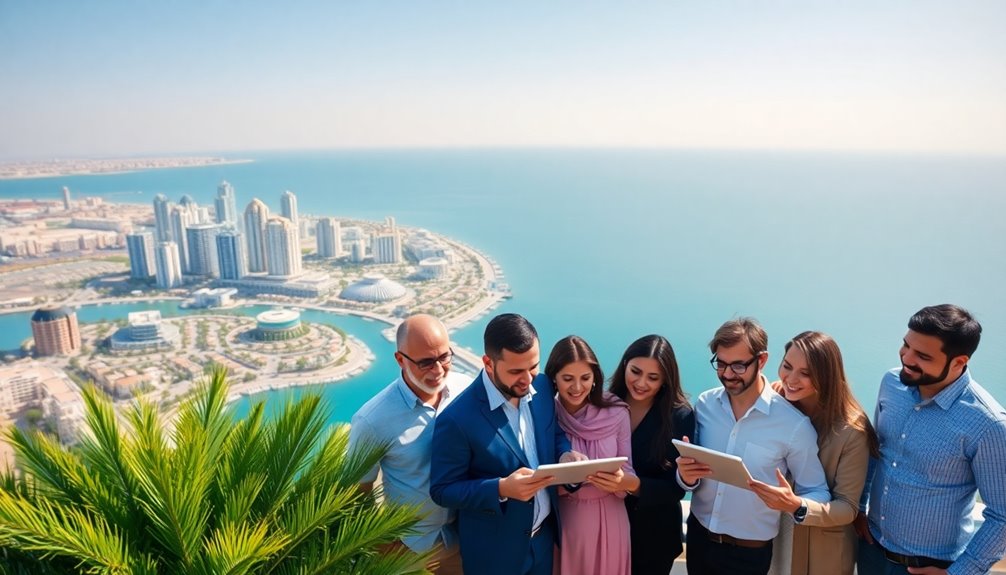
When it comes to buying property in Bahrain, understanding the eligibility for foreign ownership is vital. First, you'll need a valid passport and a clean criminal record. Health insurance that's valid in Bahrain is required, and for some transactions, you may need to provide proof of income. Notably, you don't have to be a resident to purchase property, but investing can lead to residency options.
Legally, foreigners can only buy freehold properties. You must obtain a No-Objection Certificate (NOC) from the Ministry of Interior and register property transactions with the Survey and Land Registration Bureau (SLRB). It's important to comply with local regulations and pay any required fees. Hiring a real estate lawyer to review documents is a smart move to guarantee everything's in order. Additionally, foreign ownership may require a no-objection certificate to confirm the absence of criminal records or legal issues.
Financially, there aren't preset minimum investment requirements, but a property worth at least 50,000 BHD is necessary for a residence permit.
While Bahrain is largely tax-free, you'll face a 10% municipal tax on properties. Consider financing options through conventional or Islamic banks, and don't forget to factor in maintenance costs and other fees to your budget.
Designated Areas for Investment
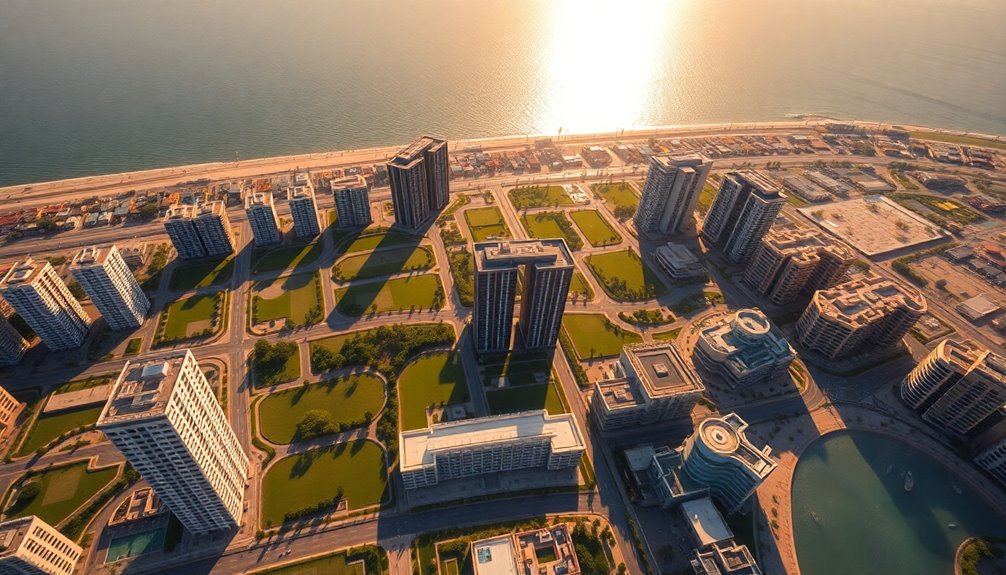
When considering where to invest in Bahrain, you'll find several designated areas that offer unique opportunities.
These popular investment locations cater to various preferences, whether you're looking for luxury living or commercial spaces. The real estate market is showing steady growth, with increased interest from foreign investors post-2020, enhancing the appeal of these designated zones.
You should also be aware that leasing options outside these designated zones may come with different regulations and considerations.
Popular Investment Locations
Exploring Bahrain's property market reveals a range of popular investment locations designated for foreign ownership. These areas cater to various preferences, whether you're looking for luxury, a vibrant community, or solid economic opportunities. Here are some top spots to contemplate:
| Investment Location | Key Features |
|---|---|
| Amwaj Islands | Luxury villas, waterfront apartments, private beaches |
| Durrat Al Bahrain | Beachfront properties, luxurious villas, marinas |
| Bahrain Bay | High-rise luxury apartments, waterfront views |
| Juffair | Vibrant nightlife, mix of affordable and high-end residential towers |
| Seef District | Upscale shopping, business centers, property gains of up to 400% since 2003 |
These locations not only promise a desirable lifestyle but also offer strong potential for property value appreciation. In addition, the high demand for residential properties particularly in these areas is driven by the growing expatriate population and government initiatives aimed at improving affordable housing. If you're contemplating investing in Bahrain, focusing on these designated areas can provide you with both comfort and a wise financial decision. Take your time to explore each option and see which aligns best with your investment goals.
Leasing Outside Designated Zones
Leasing outside designated zones in Bahrain presents unique challenges for foreign investors. Generally, you can't purchase land in non-freehold areas, as these are restricted to Bahraini citizens and GCC nationals. If you want to lease in these areas, obtaining special government permission is necessary, but this is rarely granted. The government imposes these restrictions to balance foreign investment with national interests. One way to navigate this landscape is through Build-Operate-Transfer (BOT) agreements. These allow you to use and develop land for specific projects, although ownership reverts to the government once the lease expires. Such agreements are typically reserved for large-scale initiatives.
Bahrain's robust banking environment contributes to the overall stability of the investment landscape, which can be beneficial even when leasing in non-designated zones. Be prepared for a complex approval process that requires thorough documentation and compliance with local laws. The government carefully reviews each application, focusing on its impact on national interests.
Keep in mind that risks include potential changes in government policies and limited flexibility in land use. To protect your investment, ensuring transparency and clarity in property rights is essential.
Legal Framework and Regulations
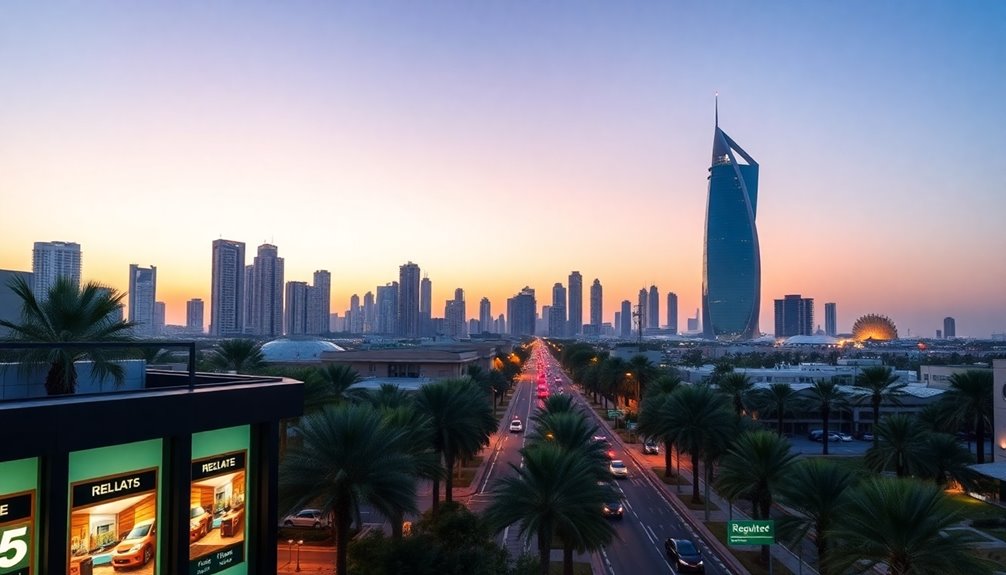
When exploring property ownership in Bahrain, it's essential to understand the legal framework that governs foreign investments. You'll need to navigate the registration requirements and guarantee compliance with local regulations to secure your investment. Familiarizing yourself with these laws can help you avoid potential pitfalls and make informed decisions. Additionally, being aware of the recent establishment of the Real Estate Regulatory Authority (RERA) can enhance transparency and support your investment journey.
Ownership Laws Overview
Maneuvering through the ownership laws in Bahrain requires understanding the specific regulations that govern foreign property acquisition. As a foreigner, you can buy property, but only in designated freehold areas like Ahmed Al-Fateh, Hoora, and Amwaj Islands.
Be aware that you're restricted from owning properties in areas reserved for Bahraini nationals.
Here are key points to keep in mind:
- Approval Requirements: If you're a GCC national, you'll need prior approval from the Minister of Justice, Islamic Affairs, and Awqaf before purchasing property.
- Tax Obligations: While Bahrain is generally tax-free, foreign property owners must pay a 10% municipal tax and registration fees ranging from 1.5% to 3%. Additionally, it's important to note that foreign ownership rights extend to both residents and non-residents.
- Rights and Responsibilities: You have the right to use, lease, and sell your property, but you must also comply with local regulations and maintain the property in good condition.
Understanding these laws is essential for a successful investment experience in Bahrain's property market.
Make sure to familiarize yourself with the local regulations to avoid any legal complications.
Registration Requirements Explained
Understanding ownership laws is just the beginning; registering your property is the next vital step in the acquisition process. All property transactions in Bahrain must be registered with the Survey and Land Registration Bureau (SLRB) to guarantee legal recognition. You need to complete registration within 60 days of your purchase.
This process involves submitting several documents, including your notarized sales agreement and proof of ownership. You'll also need identification documents like your passport and residence permit, along with proof of address and a copy of the reservation agreement. A property value report and insurance certificate are required, too. It's important to remember that locals can purchase property anywhere without restrictions, which provides a clear distinction in property ownership laws.
Keep in mind that registration fees typically range from 1.7% to 2% of the property value, depending on when you register. Additionally, a 2% stamp duty and a 10% municipal tax apply to foreign buyers.
It's wise to engage a reputable property lawyer to guide you through this process. They can help guarantee you comply with local regulations, conduct title searches, and secure necessary approvals. Taking these steps will help you navigate the complexities of property registration in Bahrain smoothly.
Compliance With Local Regulations
Maneuvering the compliance landscape in Bahrain's property market is essential for foreign investors. Understanding local regulations can save you from potential pitfalls and guarantee your investment is secure. Here are three key points to keep in mind:
- Designated Areas: Foreign ownership is only permitted in specific freehold areas like Amwaj Islands, Juffair, Seef, and Riffa 4. Outside these zones, you'll need special government permission to invest.
- Legal Framework: The property market operates under Law No. 27 of 2017, which replaced earlier regulations. Islamic Shari'a serves as a principal source of legislation, so be prepared to navigate its implications on property transactions. Additionally, the government has implemented supportive policies aimed at attracting foreign investment, enhancing opportunities in the property sector.
- Residency and Compliance: Purchasing property worth at least BHD 50,000 grants you a Self-Sponsorship Residence Permit for five years.
However, guarantee you comply with all local regulations, like registration with the Survey and Land Registration Bureau (SLRB) and maintaining your property.
Engaging a local lawyer familiar with Bahraini laws can be invaluable for guaranteeing full compliance and a smooth transaction process.
Residency Scheme for Investors
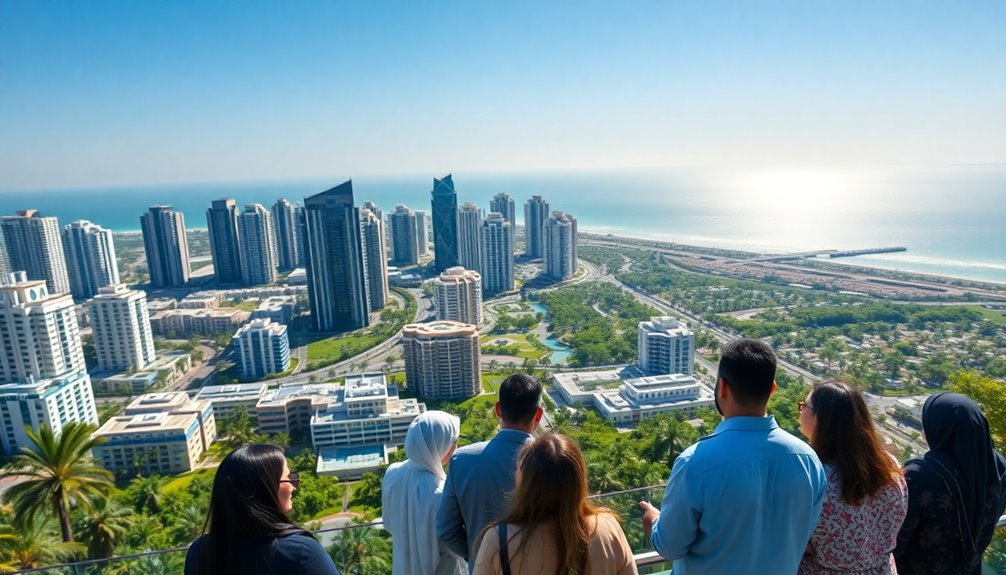
Many investors find Bahrain's Residency Scheme an attractive option for those looking to settle in the region. To qualify, you'll need to own one or more properties in Bahrain with a total value of at least BHD200,000 (around USD530,000).
If you're a professional or skilled employee, you must have lived in Bahrain for at least five years, earning an average monthly salary of BHD2,000 during that time. Retirees need to maintain a continuous five-year residency and receive a monthly income of at least BHD4,000.
For those with exceptional skills, recognition by the relevant government authority can pave the way for residency. The Golden Residency Visa offers a 10-year renewable residence permit, work authorization, and the ability to sponsor your immediate family. Additionally, this visa provides permanent residency in the Kingdom of Bahrain, enhancing your stability and investment potential.
You'll enjoy multiple entries and exits while only needing to spend 90 days a year in Bahrain. Key documents include copies of previous residence permits, a certificate of good conduct, proof of retirement if applicable, and a valid health insurance policy.
This scheme not only provides security but also opens doors to a tax-free lifestyle and a thriving business environment.
Process of Buying Property
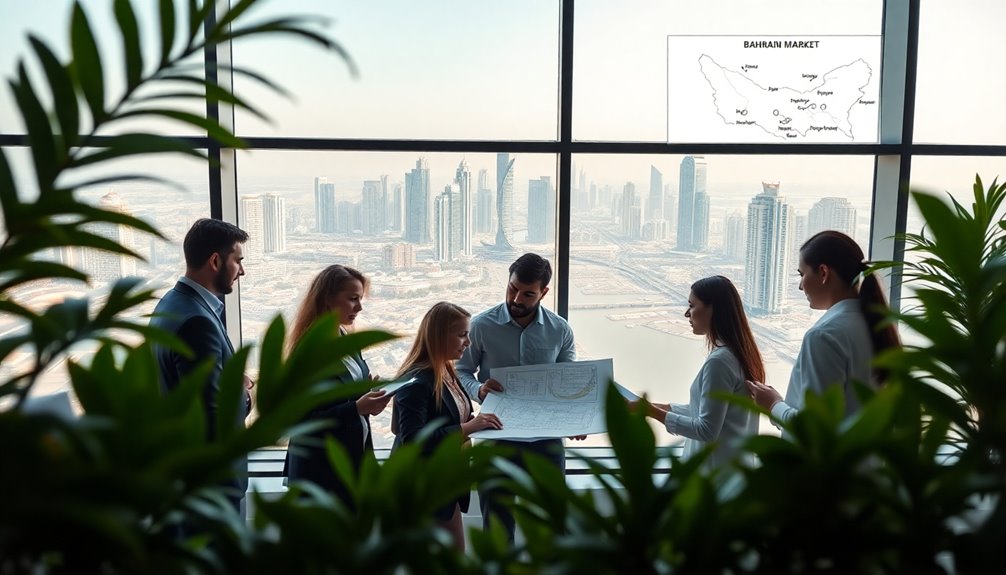
When considering the process of buying property in Bahrain, it's crucial to start with finding and selecting the right location. Foreigners can purchase properties in designated freehold areas like Ahmed Al-Fateh, Hoora, and Amwaj Islands. It's important to note that the property market demand fluctuates with global economic conditions and local developments, which can influence your investment decision.
You'll encounter luxurious villas and high-end apartments, so it's advisable to use a real estate agent to streamline the process.
Here's a simple breakdown of the steps to follow:
- Initial Agreement: Once you find a property, agree on the price and sign a reservation agreement with a 10% deposit.
- Sales Agreement: This document outlines the sale terms, payment structure, and conditions. Be sure it's notarized to make it legally binding.
- Payment Process: You'll pay the seller the agreed-upon price, usually in installments, and consult banks for mortgage options if needed.
After full payment, register the property with the Bahrain Survey and Land Registration Bureau.
Don't forget to transfer utility accounts to your name using the property title. Following these steps will help you navigate the property buying process smoothly.
Required Documentation

Gathering the necessary documentation is an important step in buying property in Bahrain. You'll need to prepare a variety of documents to guarantee a smooth transaction. Here's a breakdown of the required documentation:
| Document Type | Examples |
|---|---|
| Identification and Personal | Passport copy, ID copy, proof of address |
| Property-Related Documents | Title deed copy, property registration card |
| Financial and Banking | Bank statement, credit report, proof of income |
| Regulatory and Legal | Notarized sales agreement, approval from authorities |
Make sure you have a health insurance certificate issued in Bahrain and a certificate of good conduct. For property-related documents, a written agreement between you and the seller, along with a property valuation report, is vital. Financially, confirm you have a bank statement showing sufficient income—at least 500 BD per month for expatriate investors. Additionally, understanding the legal ownership rights in Bahrain will help ensure your investment is secure. Finally, registering with the Survey and Land Registration Bureau (SLRB) and complying with local regulations will finalize your ability to purchase property in Bahrain.
Current Market Trends
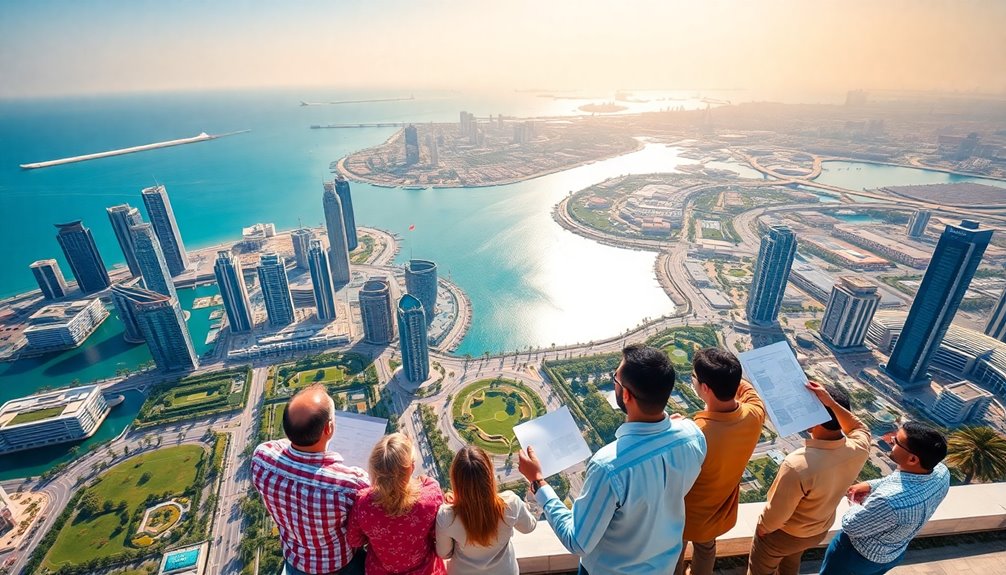
As Bahrain's property market evolves, it's essential to stay informed about the current trends shaping both residential and rental sectors.
You'll notice an imbalance between supply and demand, especially in residential units. With 1,361 new units expected by year-end, the market is seeing a 7% increase in supply, but demand isn't keeping pace, which could lead to price drops. This situation is further complicated by the fact that experts predict potential price drops if demand does not rise significantly.
Here are three key trends to keep in mind:
- Rental Rates Decline: Average rental rates for mid- to high-end apartments fell by 1.7% year-on-year, while overall rental rates dropped by 2.9% in H1 2024 compared to 2023.
- Villa Demand: Local buyers are driving demand for affordable villa units, resulting in an 8% year-on-year increase in villa sales based on square meter price.
- Transaction Growth: Real estate transactions surged by 65.4% year-on-year in Q4 2023, indicating a vibrant market despite slight declines in transaction values.
Staying updated on these trends can help you navigate the Bahrain property market more effectively.
Investment Opportunities
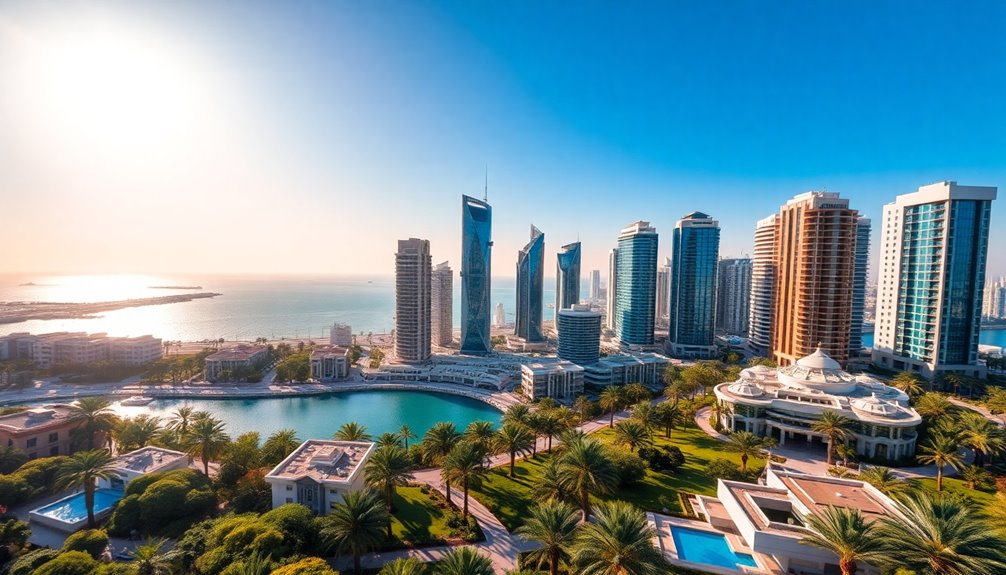
With current market trends indicating a shift in supply and demand dynamics, exploring investment opportunities in Bahrain's property market becomes increasingly attractive for foreign buyers.
Foreigners can invest in specific freehold areas such as Amwaj Islands, Bahrain Bay, and the Seef district, among others, where you can enjoy 100% ownership. These luxurious developments not only offer high living standards but also diverse property types, including residential, commercial, and mixed-use options.
Bahrain's legal framework supports foreign ownership, guaranteeing property rights are well protected under Law No. 27 of 2017. Additionally, it is important to note that specific regulations govern foreign property purchases, ensuring compliance and a secure investment experience. Plus, you'll find no property taxes, making your investment even more appealing.
If you're looking for financing, numerous banks provide mortgage loans tailored for expatriates.
Investing a minimum of 50,000 BHD can also grant you residency, allowing for self-sponsorship and the chance to renew permits every five years.
As Bahrain's GDP per capita continues to rise, the demand for real estate is expected to grow, promising lucrative rental yields.
Engaging a local lawyer familiar with Bahraini laws will help guarantee a smooth transaction as you navigate this vibrant market.
Frequently Asked Questions
Can Foreigners Buy Property in Bahrain Without a Local Partner?
Yes, you can buy property in Bahrain without a local partner.
Foreigners are allowed to purchase property in designated freehold areas, which include popular locations such as Amwaj Islands and Bahrain Financial Harbour.
You'll need to comply with specific regulations, including obtaining a no-objection certificate and registering the property.
It's a straightforward process, so you can feel confident moving forward with your investment plans in these areas.
What Types of Properties Can Foreigners Invest In?
You can invest in various types of properties, including residential options like apartments in sought-after areas and luxurious villas in exclusive developments.
If you're interested in commercial real estate, office spaces and retail units are available in prime locations.
For industrial ventures, there are manufacturing facilities and warehouses in designated zones.
Additionally, mixed-use developments combine residential and commercial spaces, offering diverse investment opportunities tailored to your preferences and financial goals.
Are There Property Taxes for Foreign Owners in Bahrain?
Notably, around 70% of foreign property owners in Bahrain enjoy a tax-friendly environment.
You won't face annual property taxes like in many Western countries. Instead, municipal taxes apply, calculated as 10% of your property's rental value.
Remember, this tax structure is only for rental income, so you can benefit from lower ongoing costs.
Just make sure to keep up with local regulations, as policies may change over time.
How Does the Property Leasing Process Work for Foreigners?
When leasing property, you'll need a written lease agreement outlining the terms like rent and duration.
You'll register this agreement with local authorities to gain legal recognition.
As a lessee, you must pay rent on time, even during disputes.
The lessor can terminate the lease for specific reasons, such as non-payment.
What Are the Potential Risks of Investing in Bahraini Real Estate?
When you consider investing in Bahraini real estate, be aware of several risks.
Economic instability tied to fluctuating oil prices can impact property values. Political unrest may deter investment, affecting market confidence.
Oversupply in the residential and office sectors could lead to stagnant prices or drops. Additionally, maneuvering through complex legal regulations can complicate transactions.
It's essential to stay informed about these factors to make sound investment decisions.
Conclusion
In summary, Bahrain’s property market offers exciting opportunities for foreign investors keen to expand their portfolios. With a clear legal framework and designated areas for investment, steering through the process becomes manageable. Are you ready to plunge into this vibrant market and secure your slice of paradise? By understanding the trends and required documentation, you can make informed decisions that set you on the path to success in Bahrain’s real estate landscape. Don’t miss out! Additionally, with the government’s commitment to economic diversification and initiatives to attract foreign investment, the Bahrain property market is poised for continued growth and stability. With its strategic location and thriving business environment, investing in Bahrain’s property market can be a lucrative move for international investors. And while the Bahamas property market may offer its own allure, exploring the opportunities in Bahrain can diversify your investment portfolio and lead to potential long-term gains.
